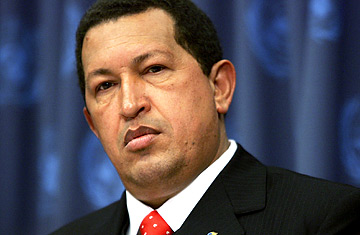
Venezuelan President Hugo Chavez speaks during a news conference while attending the United Nations General Assembly in September 2006 at the U.N. in New York City.
It was the latest in a series of recent moves that appear to be concentrating even more power in the hands of the government or, in other words, Chavez. The president reassured a cheering crowd of supporters in Caracas that the government would, in effect, yank Radio Caracas Television, a television station often critical of him, off the air by declining to renew its expiring broadcast license. He lashed out at Jose Miguel Insulza, secretary general of the Organization of American States, saying he was an "idiot" who had "lost his morals" and demanding his resignation — all because Insulza, whom Chavez actually backed in 2005 as a candidate for his job, criticized Venezuela last week for threatening press freedom.
It doesn't stop there. Chavez has begun fashioning a single Socialist party out of the many that support him, sparking fears among his critics that a one-party state is on the horizon. The government also promises to do away with the autonomy of the Central Bank and to regulate earnings for private companies. What's more, the president has once again shuffled his cabinet, giving the pink slip to his vice president and interior minister. With nine interior ministers in the last eight years and three housing ministers in as many years, critics say this strategy is aimed at preventing ministers from upstaging the president and also robs them of enough time to attack festering domestic problems like rampant crime and housing shortages.
Chavez's greatest detractors warn that these shifts, especially the single Chavista party and crackdowns on press freedom, echo Fidel Castro's reforms that shaped the Cuban Revolution in the 1960s. But unlike Cuba's overnight socialist makeover, Venezuela is opting for a transformation so slow it evokes the Chinese water torture method. And despite the incessant rhetoric, Chavez has yet to turn Venezuela into the socialist nightmare Washington says it will become — multinationals are raking in huge profits in this oil economy and trade with the U.S. is flourishing. Ultimately, Chavez needs democratic credentials to keep legitimacy in the international community. So while the nationalizations will put Chavez dangerously close, he is still likely to cleverly walk the fine line between democracy and crossing into Castro's territory.
